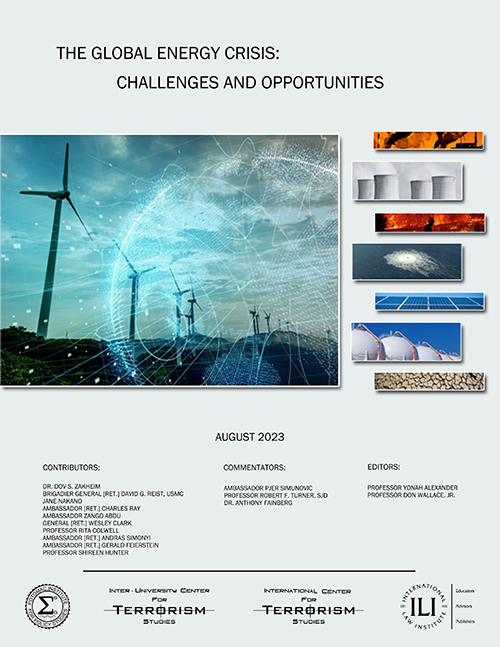 PROFESSOR YONAH ALEXANDER AND PROFESSOR DON WALLACE, JR. EDITORS
PROFESSOR YONAH ALEXANDER AND PROFESSOR DON WALLACE, JR. EDITORS
A popular English proverb provides an insightful lesson of history, “He that would know what shall be, must consider what hath been. Things present are judged by things past.” Indeed, a realistic assessment of permanent factors of domestic and international life entails consideration of factors such as the struggle of power within and among nations.
It is not surprising, therefore, that throughout recorded history national, regional, and global energy security interests and concerns required a critical focus that is expanding with every passing year. Thus, interdisciplinary published and unpublished literature reveals infinite lists of relevant terms, concepts, trends, consequences, costs, and impacts on societies past, modern, and even, to the minds of some, predictable glimpses of thousands of years hence.
This extensive lexicon brings to mind topics such as artificial intelligence, business, coal, crime, cyber, diplomacy, disasters, economy, environment, gas, leadership, media, military, nuclear, peace, propaganda, science, solar, strategy, terrorism, and war.
By June 2023, these energy-related topics have grown substantially both at home and abroad. For example, in North America frequent storms in the state of Texas, have caused the Electric Reliability Council of Texas to ask residents to cut power consumption and turn up their thermostats amid rising temperatures. This has been a growing concern in Texas, as its power grid is largely cut off from the rest of the U.S.i
Colombia’s Ecopetrol is sustaining sales to Asia at about 45% of its crude oil production even with the competition from Russian oil forcing it to offer deeper discounts.ii
In Africa, cheap contraband petrol from Nigeria abruptly doubled in price. This caused black market fuel vendors’ and commercial drivers’ businesses to collapse in Cameroon, Benin, and Togo.iii
In Europe, Germany’s energy prices have surged. Some companies are considering leaving the country altogether. Russia’s invasion of Ukraine continues to affect the rising increase of energy prices across Europe.iv
China’s fulfillment of its green energy targets for 2030 looks to be five years ahead of schedule, but coal plants are increasingly being produced as a backup for new wind and solar farms. China’s increasing capacity to generate power from wind and solar could have a significant affect on limiting impacts of rising temperatures.v
Saudi Arabia’s Aramco and France’s TotalEnergies have been awarded Engineering, Procurement and Construction contracts for the $11 billion Amiral complex in Saudi Arabia. The award of the EPC contracts marks the start of construction work on the joint petrochemical expansion.vi
Australia’s government made a $66.35 million investment into the Waratah Super battery. The project is aimed at helping ease demands on the grid as the Eraring coal power plant is set to be decommissioned in 2025.vii
The Organization of the Petroleum Exporting Countries (OPEC) announced that global oil demand will rise to 110 million barrels a day in about 20 years, increasing the world’s oil demand by 23%.viii
An International Atomic Energy Agency (IAEA) mission stated that Croatia remains committed to addressing the challenges of managing its radioactive waste shortly after the Integrated Review Service for Radioactive Waste and Spent Fuel Management Decommissioning and Remediation (ARTEMIS) review team concluded a nine-day mission to Croatia.ix
With the upcoming UN climate talks in November 2023, representatives have argued for a plan to fight climate change by welcoming oil and gas companies to participate more fully in the talks, with energy use derived from fossil fuels accounting for more than two-thirds of global emissions.x
These random media reports and many thousands of previous instances have been continuously considered by contemporary scholars, professionals, and policy-makers.

















